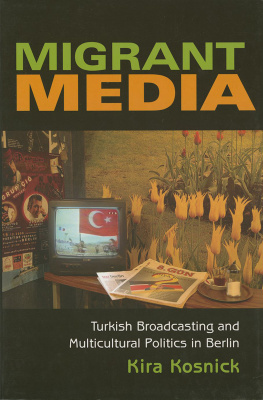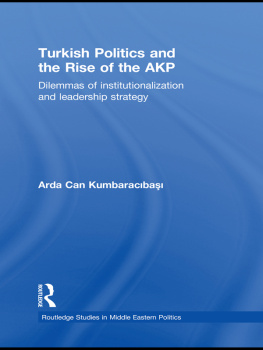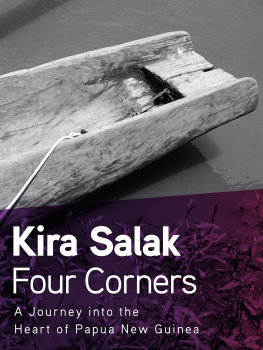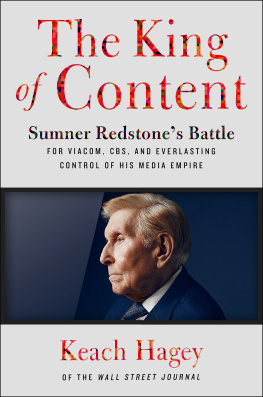This book is a publication of
Indiana University Press
601 North Morton Street
Bloomington, IN 474043797 USA
http://iupress.indiana.edu
Telephone orders 8008426796
Fax orders 8128557931
Orders by e-mail iuporder@indiana.edu
2007 by Kira Kosnick
All rights reserved
No part of this book may be reproduced or utilized in any form or by any means, electronic or mechanical, including photocopying and recording, or by any information storage and retrieval system, without permission in writing from the publisher. The Association of American University Presses Resolution on Permissions constitutes the only exception to this prohibition.
The paper used in this publication meets the minimum requirements of American National Standard for Information SciencesPermanence of Paper for Printed Library Materials, ANSI Z39.481984.
Manufactured in the United States of America
Library of Congress Cataloging-in-Publication Data
Kosnick, Kira.
Migrant media : Turkish broadcasting and multicultural politics in Berlin
/ Kira Kosnick.
p. cm. (New anthropologies of Europe)
Includes bibliographical references and index.
ISBN-13: 9780-253349484 (cloth)
ISBN-13: 9780-253219374 (pbk.)
1. Ethnic broadcastingGermanyBerlin. 2. TurksGermany
Berlin. 3. Social integrationGermanyBerlin. I. Title.
PN1991.8.E84K67 2007
302.230899435043155dc22
2007013959
1 2 3 4 5 12 11 10 09 08 07
This book is the result of debates, insights, and controversies that Ive had the privilege to share with many people across different continents. Most importantly, I have benefited from the great generosity and openness of many broadcasting activists in Berlin, without whom few of these pages could have been written. I hope that I can justify their trust, and contribute to their ongoing efforts to sustain inspiring debates against violence and enforced silences. I would also like to thank Jrgen Linke at the OKB and Friedrich vo at Radio MultiKulti, both for inviting me into their respective institutional contexts and for their openness to criticism.
I could not have embarked upon the research for this book without the financial support of the Wenner-Gren Foundation for Anthropological Research, which enabled me to carry out my fieldwork in Berlin with a pre-dissertation research grant. Their support is gratefully acknowledged.
At Indiana University Press, I thank my editor Rebecca Tolen and particularly Matti Bunzl, series editor of New Anthropologies of Europe, for his commitment to this project. I am also greatly indebted to Dominic Boyer and Martin Stokes for their helpful suggestions and criticisms as external readers. Their comments have made this a better book.
My thinking around many crucial issues of this book was inspired by the teaching of Brackette F. Williams. I thank her for opening many intellectual doors for me, including the one that led me into anthropology. The former members of the Department of Anthropology at Johns Hopkins University, most importantly Michel-Rolph Trouillot and Katherine verdery, encouraged me to pursue my own intellectual trajectory even as it led me away from their department.
At the New School for Social Research, I thank M. Jacqui Alexander and the participants of the Mobilization for Real Diversity, Democracy, and Economic Justice who importantly challenged me to think about both political and spiritual implications of my academic work. I am also greatly indebted to the members of my dissertation committee at the New School for the intellectual inspiration they provided, as well as for their perseverance and support over the years. In particular, I thank Steven Caton for his unfailing support, and for taking on the sometimes arduous work of supervising vising the completion of my Ph.D. even after leaving the Graduate Faculty of Political and Social Science. I am grateful to Rayna Rapp for her careful reading of different manuscript versions and for her astute criticism. Talal Asad provided essential intellectual guidance in the early phase of conceptualizing my research project. victoria Hattam generously agreed to engage with its outcomes. Margarita Alario has been a crucial friend and intellectual interlocutor in the process of writing up my thoughts.
I thank Faye Ginsburg for her ongoing encouragement and advice,aswell as for the opportunity to present my thoughts at the Program in Culture and Media at New york University.Thanks is also due to Dorle Drackl and all the participants of the Media Anthropology Summer School in Hamburg, for their supportive criticism and their efforts to transform the discipline of anthropology. To the OKB seminar group at Humboldt University in Berlin, including Anke Bentzin, Jeanine Dayeli, Ayfer Durdu, Riem Spielhaus, and Gerdien Jonker, I am grateful for inviting me into your debates and for giving so much to a shared project. I also thank Thomas Faist, Eyp zveren, and the participants of the Turkish-German Summer Institute for their insights and support of young scholars.
As a Marie-Curie Research Fellow at the University of Sussex, I have greatly benefited from Ralph D. Grillos persistent support and engaged criticism at crucial junctures. Richard Black, Russell King, and Nancy Wood provided me with a supportive environment during my stay at the Centre for Migration Research. I thank Nicole Wolf, Anniken Hagelund, Charlotte Sever, and Nicola Mai for their intellectual companionship and laughter. Roger Bromley and my former colleagues at Nottingham Trent University have made possible the impossible task of coping with both writing and teaching responsibilities. I would like to thank Gary Needham and Olga Guedes-Bailey for their ongoing encouragement. Thanks to my parents for putting many things into perspective.
In Istanbul, I thank zm Basmaz, zlem Kanpara, and dil Glbalkan for their unconditional friendship, generosity, and patience with my never-ending questions uttered in imperfect Turkish.
In Berlin, Shermin Langhoff, Martina Priessner, Hanna Keller, and Tuncay Kulaolu taught me lots about teamwork, cultural-political activism, and sticking together in difficult times. They made crucial contributions to my postdoctoral research in the context of the European Union Fifth-Framework Project Changing City Spaces, as did Brigitta Busch, Kevin Robins, Asu Aksoy, Heidi Armbruster, and Nadia Kiwan. To Stefanie Jordan, Tijen Durkut, pek pekiolu, and Hlya Karc, thanks for offering manifold challenges, explanations, and assistance. Above all, I thank Claudia Krams, for being there with all her love, political passion, sharp intellect, and sense of justice.
MIGRANT MEDIA
It was hot on a late summer evening in Berlin in 1994. The living room windows of Deniz and Zerdis apartment were wide open, facing a busy street in the western district of Schneberg. The kids had just gone to bed, after an hour of exchanging banter with me in English at their parents request. The English lesson was over, and we were to move on to the Turkish part, with me as the student. Yet, Deniz and Zerdi, both in their early 30s, were firmly placed in front of the television, channel-zapping as they tried to catch news on the Kurdish rally that had taken place earlier that day in Frankfurt. They had wanted to go, but could not leave their newspaper store, where they worked long hours six days a week. Deniz got lucky with the German public service channel ARD, which briefly covered the rally in its evening news program. The report stated that 15,000 people had attended the rally from all over Germany. Deniz exclaimed, Not truethere were twice as many! Zerdi told me that they had heard about the numbers who attended the rally from relatives who had participated. But television always lies, Deniz said, adding that the Turkish channels are fascist anyhow, and the only place where you can get the truth is the Kurdish programs on the Open Channel. There were lots of programs produced by migrants from Turkey on Berlins open access television channel, they told me, and some of their friends were broadcasting there as well.










